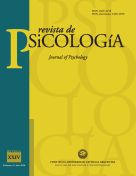Please use this identifier to cite or link to this item:
https://repositorio.uca.edu.ar/handle/123456789/6144| Título: | Familias de adolescentes infractores penales reiterantes : funcionamiento, roles y coaliciones parentales Recurrent juvenile criminal offenders' families : parental functioning, roles and coalitions |
Autor: | Valgañón, Mónica Muñoz, Liliana Ferrandiz, Agustina Quiroga, María Paula |
Palabras clave: | PARENTALIDAD; ADOLESCENTES; DELINCUENCIA JUVENIL; ROL DE LA FAMILIA; PSICOLOGIA | Fecha de publicación: | 2016 | Editorial: | EDUCA Universidad Católica Argentina. Facultad de Psicología y Psicopedagogía. Departamento de Psicología |
Cita: | Valgañón, M., Muñoz, L., Ferrandiz, A., Quiroga, M. P. (2016). Familias de adolescentes infractores penales reiterantes : funcionamiento, roles y coaliciones parentales [en línea]. Revista de Psicología, 12(24). Disponible en: https://repositorio.uca.edu.ar/handle/123456789/6144 | Resumen: | Resumen: El presente trabajo se focaliza en la problemática del funcionamiento de las familias de los adolescentes que reiteran la conducta delictiva, enfatizando el análisis de los roles y coaliciones parentales. Se abordó a las familias y jóvenes registrados en el Sistema de Responsabilidad Penal Juvenil, derivados del Fuero Penal de Menores de Mendoza, Zona Norte, Argentina. El enfoque metodológico fue de corte cualitativo, se utilizó como instrumento principal de indagación el Test de las Imágenes de las Relaciones Familiares (Usandivaras, 2004), que fue tomado en los domicilios de las familias obtenidos luego del estudio de expedientes institucionales. Se administró la prueba a setenta y ocho personas que constituían veinticuatro familias. Como resultado se obtuvo un perfil de funcionamiento familiar respecto a patrones de integración, adaptabilidad, cohesión y evolución del grupo, como también una descripción del tipo de relación entre el progenitor y el menor de edad infractor de la ley penal. Se concluye que la tendencia de las familias se orienta hacia la evolución regresiva, las madres no ejercen la jerarquía propia del rol materno, desdibujando límites por periferia o aglutinamiento, los padres muestran ausencia o periferia. Finalmente se destaca la presencia de problemática de género. Abstract: This articule focuses on the problem of the functioning of adolescent's families who reiterate the criminal behavior, emphasizing the analysis of the roles and parental coalitions. To achive this, the families and the young registered in the Juvenile Criminal Responsibility System, derived from the Criminal Offense of Minors of Mendoza, North Zone, Argentina, were approached. The methodological approach was a qualitative one; the Image Test of Family Relations (Usandivaras, 2004) was used as the main instrument of inquiry, which was taken from the families'home addresses obtained after the study of institutional records. The trial was administered to seventy-eigth people who constituted twenty-four families. As a result, a family functionig profile was obtained regarding patterns of integration, adaptability, cohesion and evolution of the group, as well as a description of the type of relationship between the parent and the juvenile offender of the criminal law. It is concluded that the tendency of families is oriented towars the regressive evolution, mothers do not exert the hierarchy proper of the maternal role, blurring boundaries by periphery or agglutination, and fathers show absence or periphery. Finally, the presence of gender issues is highlighted. |
URI: | https://repositorio.uca.edu.ar/handle/123456789/6144 | ISSN: | 1669-2438 | Disciplina: | PSICOLOGIA | Derechos: | Acceso Abierto | Fuente: | Revista de Psicología, 12(24), 2016 |
| Appears in Collections: | RdP - 2016 Vol. 12 nro. 24 |
Files in This Item:
| File | Description | Size | Format | |
|---|---|---|---|---|
| familias-adolescentes-infractores-valganon.pdf | 598,06 kB | Adobe PDF |  View/Open |
Page view(s)
771
checked on Apr 30, 2024
Download(s)
775
checked on Apr 30, 2024
Google ScholarTM
Check
This item is licensed under a Creative Commons License

